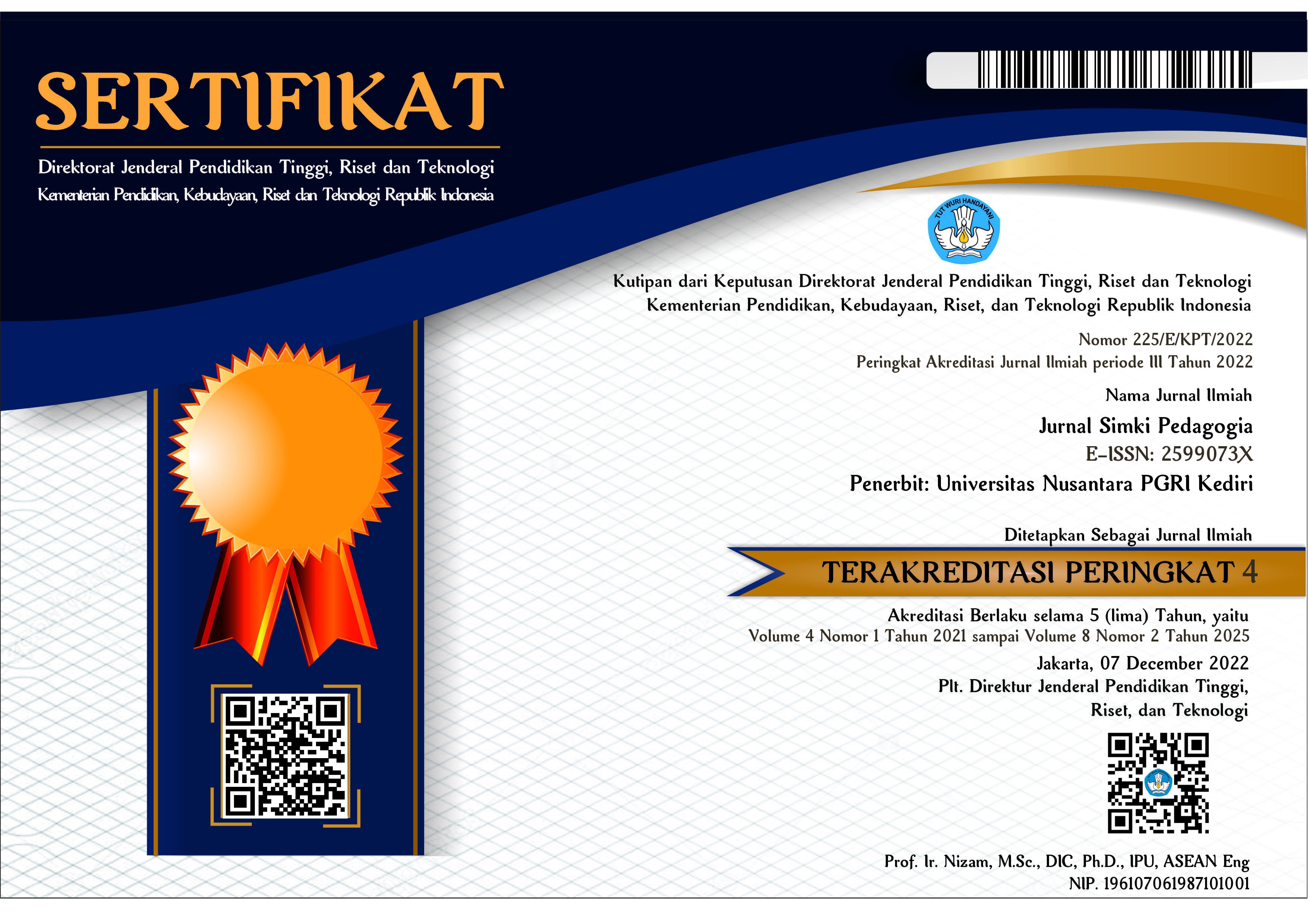Remedial Learning Implementation Through the Peer-Tutor Method in The Entrepreneurship Course
 Abstract views: 306
,
Abstract views: 306
,
 PDF downloads: 193
PDF downloads: 193
Abstract
The global issue appears on the students' problem, especially in remedial learning.The purposes of this study are: (1) to describe the activities of lecturers in classroom management and remedial activities, (2) to describe the activities of students in peer-tutor learning method, (3) to describe students' learning mastery after having remedial activity with the peer-tutor method. The type of this research is action research, consisting of planning, action and observation, reflection, and revision. The action was given in three rounds in the classroom (Classroom Action Research). This research was conducted in STKIP PGRI Jombang, Economic Education Study Program. This research was conducted from August to September 2022. The subject of this research is 44 students of STKIP PGRI Jombang. The object of this study is Break-Even Point (BEP) material. Findings show that the average skill of the lecturer in managing the class and remedial activity in 3 rounds of Classroom Action Research is 3.29% which indicates that the lecturer has succeeded in improving students' achievement.
Downloads
References
Bessho, S. ichiro, Noguchi, H., Kawamura, A., Tanaka, R., & Ushijima, K. (2019). Evaluating remedial education in elementary schools: Administrative data from a municipality in Japan. Japan and the World Economy, 50. https://doi.org/10.1016/j.japwor.2019.04.003
Calma, A., & Eggins, M. (2012). Enhancing the Quality of tutorials through Peer-Connected Tutor Training. Issues in Educational Research, 22(3). https://eric.ed.gov/?id=EJ997339
Demak, I. P. K., Tanra, A. A. M., Syamsi, N., Nur, R., & Wahyuni, R. D. (2021). Learning pharmacology through peer tutoring. Gaceta Sanitaria, 35. https://doi.org/10.1016/j.gaceta.2021.10.098
Duran, D. (2010). Cooperative Interactions in Peer Tutoring: Patterns and Sequences in Paired Writing. Middle Grades Research Journal, 5(1). https://eric.ed.gov/?id=EJ888660
Fauzi, S. S. M., & Hussain, R. M. R. (2016). Designing instruction for active and reflective learners in the flipped classroom. Malaysian Journal of Learning and Instruction, 13(2). https://eric.ed.gov/?id=EJ1134740
Grubbs, N., & Boes, S. R. (2009). The Effects of the Peer Tutoring Program: An Action Research Study of the Effectiveness of the Peer Tutoring Program at One Suburban Middle School. Georgia School Counselors Association Journal, 16(1). https://eric.ed.gov/?id=EJ871911
Hine, G. S. C. (2013). The importance of action research in teacher education programs. Issues in Educational Research; v.23 n.2 p.151-163; June 2013, 23(2), 151–163. https://eric.ed.gov/?id=EJ1016382
Hong, C. E., & Lawrence, S. A. (2011). Action research in teacher education: Classroom ınquiry, reflection, and data-driven decision making. Journal of Inquiry & Action in Education, 4(2). https://digitalcommons.buffalostate.edu/jiae/vol4/iss2/1/
Kasran, S. B., Toran, H., & Amin, A. M. (2012). Issues and Trends in Remedial Education: What Do the Teachers Say? Procedia - Social and Behavioral Sciences, 47. https://doi.org/10.1016/j.sbspro.2012.06.869
Kemmis, S. (2009). Action research as a practice-based practice. Educational Action Research, 17(3). https://doi.org/10.1080/09650790903093284
Kim, S. C., Jillapali, R., & Boyd, S. (2021). Impacts of peer tutoring on academic performance of first-year baccalaureate nursing students: A quasi-experimental study. Nurse Education Today, 96. https://doi.org/10.1016/j.nedt.2020.104658
Li, W. S. S., & Arshad, M. Y. (2015). Inquiry practices in Malaysian secondary classroom and model of inquiry teaching based on verbal interaction. Malaysian Journal of Learning and Instruction, 12(1). https://doi.org/10.32890/mjli2015.12.8
Luoch, T. O. (2014). The Impact of Remedial English on the Improvement of English Proficiency: The Case of the United States International University-Africa. Procedia - Social and Behavioral Sciences, 152. https://doi.org/10.1016/j.sbspro.2014.09.296
Maruyama, T., & Kurosaki, T. (2021). Do remedial activities using math workbooks improve student learning? Empirical evidence from scaled-up interventions in Niger. World Development, 148. https://doi.org/10.1016/j.worlddev.2021.105659
Miravet, L. M., Ciges, A. S., & García, O. M. (2014). An Experience of Reciprocal Peer Tutoring at the University. Procedia - Social and Behavioral Sciences, 116. https://doi.org/10.1016/j.sbspro.2014.01.661
Pugatch, T., & Wilson, N. (2018). Nudging study habits: A field experiment on peer tutoring in higher education. Economics of Education Review, 62. https://doi.org/10.1016/j.econedurev.2017.11.003
Selvarajan, P., & Thiyagarajah Vasanthagumar, ; (2022). The impact of remedial teaching on improving the competencies of low achievers. International journal of social science & interdisciplinary research. https://www.gejournal.net/index.php/IJSSIR/article/view/189
Svellingen, A., Røssland, A., & Røykenes, K. (2021). Students as Facilitators: Experiences of Reciprocal Peer Tutoring in Simulation-Based Learning. Clinical Simulation in Nursing, 54. https://doi.org/10.1016/j.ecns.2021.01.008
Thurston, A., Roseth, C., Chiang, T. H., Burns, V., & Topping, K. J. (2020). The influence of social relationships on outcomes in mathematics when using peer tutoring in elementary school. International Journal of Educational Research Open, 1. https://doi.org/10.1016/j.ijedro.2020.100004
Topping, K. J., Dehkinet, R., Blanch, S., Corcelles, M., & Duran, D. (2013). Paradoxical effects of feedback in international online reciprocal peer tutoring. Computers and Education, 61(1). https://doi.org/10.1016/j.compedu.2012.10.002
Ullah, I., Tabassum, R., & Kaleem, M. (2018). Effects of peer tutoring on the academic achievement of students in the subject of biology at secondary level. Education Sciences, 8(3). https://doi.org/10.3390/educsci8030112
Walsh, C. M., Rose, D. N., Dubrowski, A., Ling, S. C., Grierson, L. E. M., Backstein, D., & Carnahan, H. (2011). Learning in the simulated setting: a comparison of expert-, peer-, and computer-assisted learning. Academic medicine : journal of the Association of American Medical Colleges, 86(10 Suppl). https://doi.org/10.1097/acm.0b013e31822a72c7
Copyright (c) 2024 Ninik Sudarwati, Suharto, Nur Iffah

This work is licensed under a Creative Commons Attribution 4.0 International License.

Jurnal Simki Pedagogia : https://jiped.org/index.php/JSP/index is licensed under a Creative Commons Attribution 4.0 International License.
















